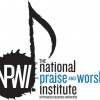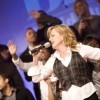 Last week I told you about the many similarities between musicians of every genre, including praise teams. (See my post on “I See the Resemblance”)
Last week I told you about the many similarities between musicians of every genre, including praise teams. (See my post on “I See the Resemblance”)
But worship teams are definitely different than the average band in several ways, too. As I sat down to write this, I came up with 7 ways they are distinct and quite unlike many musical groups.
I’m sure it’s not a complete list… in fact, if you can think of other atypical traits, go ahead and weigh in below.
But these are the worship band differences I came up with:
- Worship bands usually don’t rehearse on any one song as much as other artists do, because they’re learning brand new songs every week.
- Most people on the worship team don’t want to make a career out of music.
- There can be an extremely wide range of musical experience within the group.
- A worship team wants to direct the listener’s attention to what’s important, but where they direct their attention can be different than the usual band.
- A praise team is usually playing someone else’s songs – not original compositions.
- They usually play in the mornings (definitely unique!) with the “audience” rushing to get there on time!
- The worship team is not the reason people come – the event (church service) and the “message” is.
So does that mean worship teams have unique problems?
One of the main jobs of the worship band is to create freedom in the room so the “Spirit can move.” But I see many artists playing songs, just hoping something spiritual will happen. They don’t change the pressure on the congregation, have few technical onstage skills, and don’t know how to rearrange the song to leave space for a spiritual connection.
There is a homogenization of worship teams. I travel all around the world and one worship team looks like/sounds like another. They’re playing the same songs, same arrangements, delivered the same way – and I think to myself, “I just left LA, how could this worship team beat me here to New York!” (And you wonder why people would rather see U2 than show up on a Sunday morning?)
Now I’m not saying you need to become U2 or Springsteen. But I am saying you need to create freedom in the room. And how can that be done if the people on the platform are concerned about things like “should I move, should I raise my hand, I’ve got to be humble”? That’s not humility. Real humility is forgetting about yourself, and about helping your congregation forget themselves so that they can truly worship.
Not long ago, I worked with the worship team at the largest church in New Zealand, teaching those musicians how to lead their congregation in Expressive Worship. You see, I want worship teams to become more authentic, break out of their homogenization (their ruts), and take their worship to the next level!
One of the concepts I covered during that workshop was how to flesh out ideas in rehearsals that can help you with spontaneity (“listening to the Spirit”) when you’re in front of a congregation or an audience. Watch this clip from the workshop:
Whether you are a worship artist, a praise team leader, or the occasional Sunday morning singer – you do have unique differences from other musicians.
But you also have many of the same goals, as well as many of the same obstacles. Learning the skills and techniques necessary to capture and engage your congregation, create special moments for them, and to help them experience a change in their lives is one of the most important things you can do.








I’d add to your list
- worship bands do not have the same level of support professionals operating and creating in the areas of sound, lights, video, stage set/design, etc.
- worship bands often do not use the same musicians from week to week (using rotations) nor do they work with the same support people in the areas of sound, lights, video, etc. from week to week.
These two differences challenge the worship band’s ability to provide consistency and quality. Although, a rotation approach provides many layers of congregational participation, it does so at the expense of consistency, quality, and even familiarity worship ministers aspire to have with the songs they teach their congregations. Often the only consistent person from week to week is the worship minister/leader. Add to this difference an “audience” that does NOT change from week to week and it complicates expectations even further.